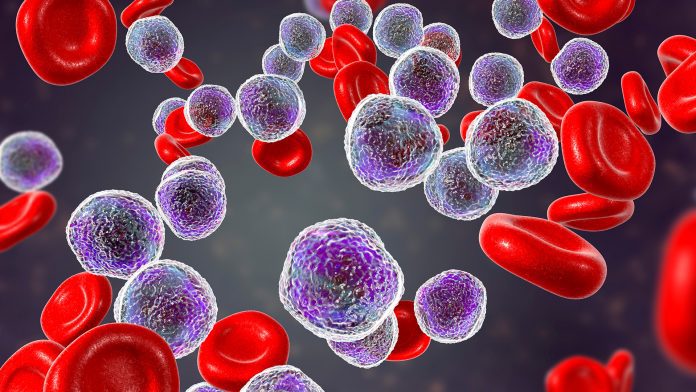
A new targeted drug for treating acute myeloid leukaemia has been granted authorisation following a study from the University of Helsinki.
The aim of targeted drugs is to supplement chemotherapy in the treatment of cancer. These drugs only affect cancerous cells and leave healthy cells alone. Venetoclax is a new targeted therapy option created for treating acute myeloid leukaemia.
Venetoclax works by sensitising cancer cells to programmed cell death. However, a new study has shown that venetoclax is ineffective against erythroid and megakaryoblastic leukaemia, two rare subtypes of the disease that are difficult to treat. In these forms of leukaemia, malignant cells resemble blood stem cells that produce red blood cells or platelets. Currently, very few treatment options are available for patients with these leukaemia types.
A study titled ‘Erythroid/megakaryocytic differentiation confers BCL-XL dependency and venetoclax resistance in acute myeloid leukaemia’ was completed by the University of Helsinki in collaboration with HUS Comprehensive Cancer Centre and the University of Copenhagen. The study was published in the Blood journal in December.
Treating acute myeloid leukaemia subtypes
The researchers identified a new protein which may offer an alternative therapeutic option to patients with these subtypes of acute myeloid leukaemia.
The research team screened over 500 pharmaceutical agents they thought could be effective against erythroid or megakaryoblastic leukaemia cells. They found that BCL-XL protein inhibitors were particularly effective in killing cancer cells isolated from these types of leukaemia.
The researchers noticed that this protein had a similar function of preventing cells from being driven to programmed cell death as BCL-2, the target of venetoclax. Currently, BCL-XL inhibitors are not used to treat patients with acute myeloid leukaemia, but their efficacy and safety are under investigation in clinical trials.
“The introduction of venetoclax has significantly improved the prognosis of acute myeloid leukaemia patients. However, our research indicates that venetoclax is unlikely to function optimally against the subtypes of acute myeloid leukaemia in our focus. Nevertheless, the finding should be verified in larger patient datasets,” said physician and scientist Olli Dufva.
Making targeted drugs more accurate
Acute myeloid leukaemia is the most common form of acute leukaemia in adults. Based on mutations and the degree of differentiation of leukaemia cells, the disease can be divided into subtypes. One of the challenges associated with targeted drugs is identifying patients who will benefit from the new drug options. The researchers hope their findings can help make the selection of targeted drugs more precise.
“The laboratory findings provide evidence that patients with erythroid or megakaryoblastic acute leukaemia would be a promising group for investigating the efficacy of BCL-XL inhibitors in clinical use,” said postdoctoral researcher Heikki Kuusanmäki.
According to the researchers, the BCL-XL inhibitors will be trialled in the treatment of these leukaemia types in the near future.
“This finding may in the future improve the prognosis of this very rare and difficult-to-treat leukaemia,” concluded Professor of Translational Haematology Satu Mustjoki from the University of Helsinki and HUS Comprehensive Cancer Centre.










